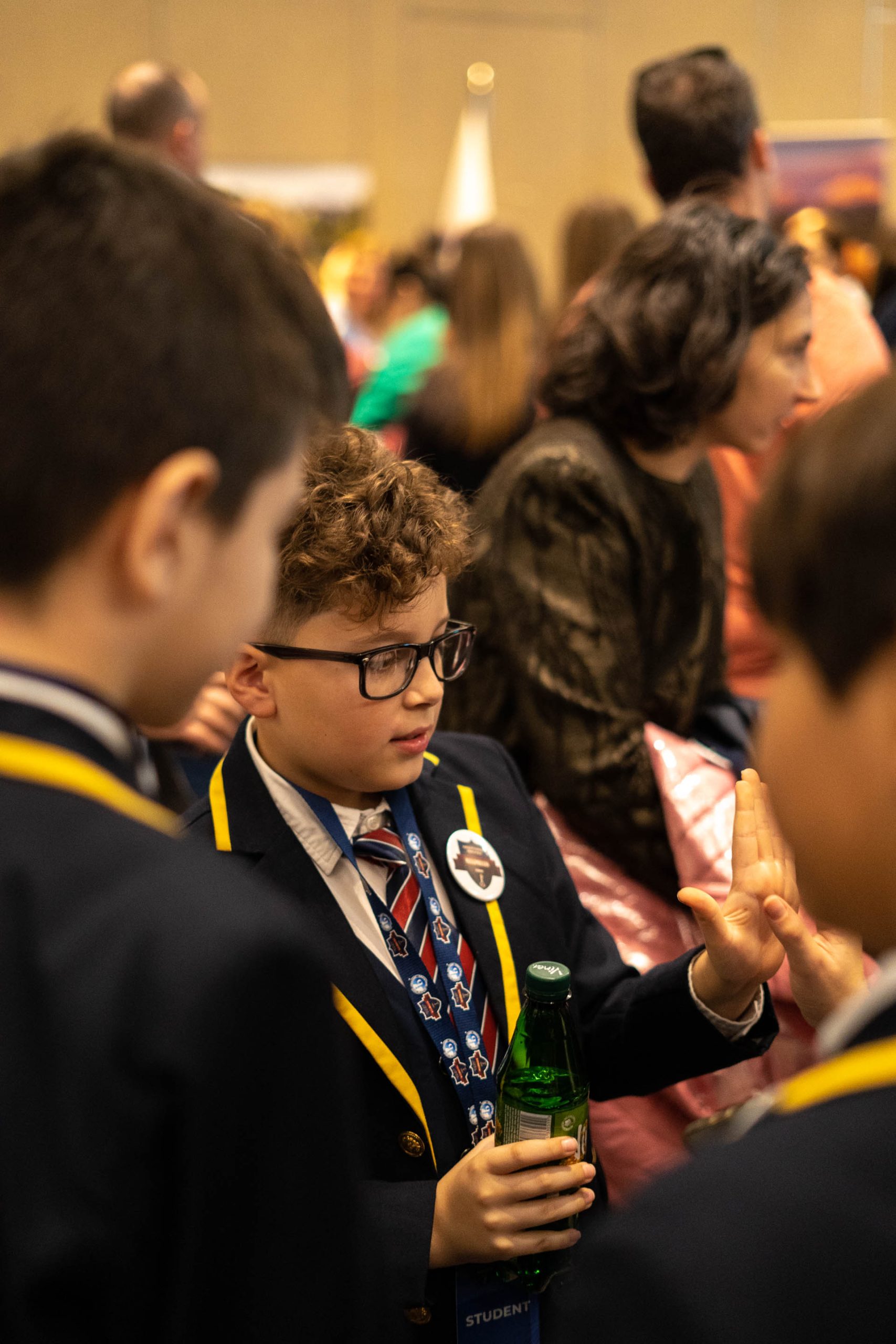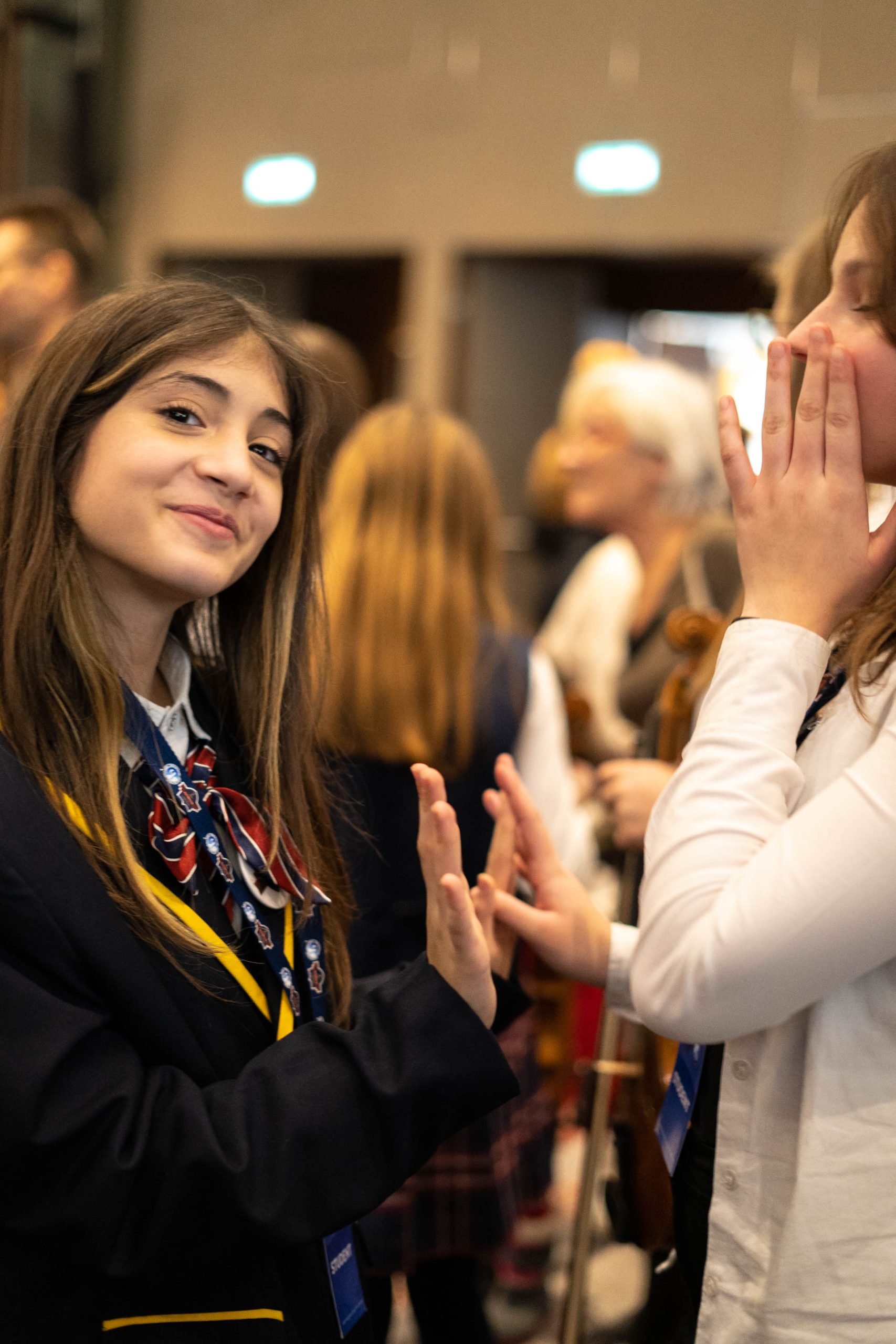Secondary program
Age of students
This program is designed for students aged 11.5 to 14 | School Years 6-9

Secondary School (Years 6 to 9)
In our International Secondary School Program, students will study a wide range of academic subjects taught by enthusiastic specialist teachers. Moving into the program , pupils are encouraged to develop their understanding of a range of studies in greater detail while also deepening their independence, resilience, and personal commitment. A diverse offering of subjects allows pupils to develop a broad set of skills and knowledge and equips them with a passion for learning before they take a more active role in their choice of examination subjects. In order to prepare and enhance students’ soft skills, frequent PSCHEE (Personal, Social, Citizenship, Health, and Economic Education) classes are provided to all students in these year groups; the aim being to strengthen community bonds within the school and to provide students with the skills necessary to collaborate and to succeed in the future.
Grades
- Grade 6 - age of students: 10.5 - 11.5 years
- Grade 7 - age of the students: 11.5 - 12 years
- Grade 8 - age of the students: 12.5 - 13 years
- Grade 9 - age of the students: 13.5 - 14 years

Our Secondary Program at International School Maximilian caters to students in grades 6 to 9, providing them with a dynamic and well-rounded educational experience. In this phase of their academic journey, students are introduced to a diverse range of subjects, each taught by specialized, single-subject teachers. This approach ensures that students benefit from the expertise of educators who are passionate and highly qualified in their respective fields.
Our secondary curriculum is designed to challenge and inspire students, fostering their critical thinking skills, creativity, and independence. In addition to core subjects such as mathematics, science, language arts, and social studies, students have the opportunity to explore various elective courses, allowing them to discover and nurture their individual interests and talents.
We emphasize holistic development, promoting not only academic excellence but also character building, leadership skills, and a strong sense of social responsibility. Our students actively engage in extracurricular activities, sports, and community service, further enriching their educational journey.
At International School Maximilian, we understand the importance of preparing students for the challenges of the modern world. Our secondary program equips them with the knowledge, skills, and values needed to thrive in a globally interconnected society. We are dedicated to nurturing confident, compassionate, and responsible individuals who are well-prepared for their future endeavors.
SUBJECTS
The overarching aim for English in the national curriculum is to promote high standards of language and literacy by equipping pupils with a strong command of the spoken and written word, and to develop their love of literature through widespread reading for enjoyment. The curriculum aims to ensure that all pupils:
- Read easily, fluently and with good understanding
- Develop the habit of reading widely and often, for both pleasure and information
- Acquire a wide vocabulary, an understanding of grammar and knowledge of linguistic conventions for reading, writing
and spoken language - Appreciate our rich and varied literary heritage
- Write clearly, accurately and coherently, adapting their language and style in and for a range of contexts, purposes and
audiences - Use discussion in order to learn; they should be able to elaborate and explain clearly their understanding and ideas
- Are competent in the arts of speaking and listening, making formal presentations, demonstrating to others and
participating in debate
Macedonian is an obligatory subject in our school for Macedonian speaking students. It covers the history of the Macedonian language, phonetics, phonology, prose, poetry. The curriculum is constituted in full accordance to the Macedonian framework.
In this class, the students have the opportunity to focus on Macedonian books and to develop love and passion towards reading books adequate for their age.
At International School Maximilian, we believe in the importance of fostering multilingualism from an early age. Starting from Grade 3, our students embark on an exciting journey into the world of foreign languages. At this pivotal stage in their education, students have the opportunity to choose between two renowned languages: German and French. Our dedicated language instructors provide engaging and immersive language experiences, helping our students develop not only linguistic proficiency but also cultural awareness. This early exposure to foreign languages sets the foundation for effective communication and opens doors to a globalized world. We are committed to nurturing language skills that will benefit our students throughout their academic journey and beyond.
The curriculum aims to ensure that all pupils:
- Become fluent in the fundamentals of mathematics, including through varied and frequent practice
with increasingly complex problems over time, so that pupils develop conceptual understanding and
the ability to recall and apply knowledge rapidly and accurately - Reason mathematically by following a line of enquiry, conjecturing relationships and
generalisations, and developing an argument, justification or proof using mathematical language - Can solve problems by applying their mathematics to a variety of routine and non-routine problems
with increasing sophistication, including breaking down problems into a series of simpler steps and
persevering in seeking solutions
Number
- Integers, powers and roots
- Place value, ordering and rounding
- Fractions, decimals, percentages, ratio and proportion
- Calculation
Algebra
- Expressions, equations and formulae
- Sequences, functions and graphs
Geometry
- Shapes and geometric reasoning
- Position and movement
Measure
- Length, mass and capacity
- Times and rates of change
- Area, perimeter and volume
Handling data
- Planning and collecting data
- Processing and presenting data
- Interpreting and discussing results
- Probability
- Using techniques and skills in solving mathematical problems
- Using understanding and strategies in solving problems.
This curriculum framework covers four content areas: scientific enquiry, biology, chemistry and physics.
The curriculum aims to ensure that all pupils:
- Develop scientific knowledge and conceptual understanding through the specific disciplines of biology, chemistry and physics
- Develop understanding of the nature, processes and methods of science through different types of science enquiries that help them to answer scientific questions about the world around them
- Are equipped with the scientific knowledge required to understand the uses and implications of science, today and for the future.
The four strands and substrands are:
Strand: Scientific enquiry
- Ideas and evidence
- Plan investigative work
- Obtain and present evidence
- Consider evidence and approach
Strand: Biology
- Plants
- Humans as organisms
- Cells and organisms
- Living things in their environment
Strand: Chemistry
- States of matter
- Material properties
Strand: Physics
- Forces and motion
- Energy
- The Earth and beyond
In the social studies class, Lower Secondary students learn:
- Geography
- History
By attending this class, in the Geography part the students start by learning the basis about Geography, planet Earth, the continents, countries, oceans, seas, lakes and mountains.
In the history part of this subject, the students learn the complete history of the countries beginning from Early ages, though Middle ages and to Modern times.
The music classes in our school are focusing in two sections:
- Theory of Music
- Practical part
Our music teachers are ready to develop the love towards music in every student. The music classes are time of the day when the students get to enjoy good and quality music, by also learning the history behind it as well as learning about the musicians.
Art is an integral part of the Secondary Years Programme at International School Maximilian, where creativity flourishes, and self-expression is celebrated. In these formative years, students are encouraged to explore the world of visual arts, allowing their imagination to take flight and their artistic talents to blossom. Our dedicated art teachers provide a nurturing environment where students can experiment with various techniques, mediums, and styles.
Through the study of art, students not only develop their technical skills but also cultivate critical thinking and problem-solving abilities. They learn to appreciate the cultural and historical significance of art, exploring diverse artistic traditions and movements. Our curriculum emphasizes both traditional and contemporary art forms, ensuring a well-rounded art education.
Beyond the classroom, students have opportunities to showcase their artwork in exhibitions, participate in collaborative projects, and engage in community-based art initiatives. Art education in our Secondary Years Programme fosters creativity, self-confidence, and an enduring love for the arts, enriching the overall educational experience for our students.
In today’s digitally connected world, information and communication technology (ICT) play a pivotal role in education. At International School Maximilian, we recognize the significance of ICT skills for our students in the Secondary Years Programme (SYP). Our school is equipped with state-of-the-art technology resources, and we integrate ICT seamlessly into the curriculum to prepare students for the digital age.
Through the SYP, students not only acquire essential computer literacy but also delve into advanced ICT concepts. They learn to harness the power of technology for research, creativity, and problem-solving. Our dedicated ICT teachers guide students in developing skills such as coding, data analysis, and multimedia production. Moreover, we emphasize responsible digital citizenship, ensuring that students use technology ethically and safely.
ICT is not limited to the classroom; students have opportunities to engage in tech-related clubs, competitions, and projects, fostering a passion for innovation and entrepreneurship. As they progress through the SYP, our students emerge as tech-savvy individuals equipped with the skills and knowledge to excel in an increasingly digital world.
At International School Maximilian, we place great importance on physical education as an integral part of our Secondary Years Programme (SYP). We believe that a holistic education encompasses not only academic excellence but also the development of a healthy body and mind. In our well-equipped facilities, dedicated physical education instructors work closely with our students to promote physical fitness, sportsmanship, and a lifelong commitment to a healthy lifestyle.
The SYP physical education curriculum offers a diverse range of sports and activities, allowing students to explore and excel in areas that resonate with their interests and abilities. From team sports like soccer and basketball to individual pursuits such as swimming and athletics, students have the opportunity to discover their strengths and develop essential life skills like teamwork, leadership, and resilience.
We understand that physical activity is not only about competition but also about well-being. Through our program, students learn to set and achieve fitness goals, manage stress, and prioritize their health. We encourage a love for movement and sports that extends beyond the classroom, fostering a culture of wellness among our students. In the SYP, physical education is not just about exercise; it’s about nurturing the overall development of confident, healthy, and balanced individuals.



